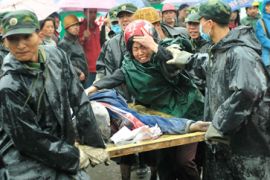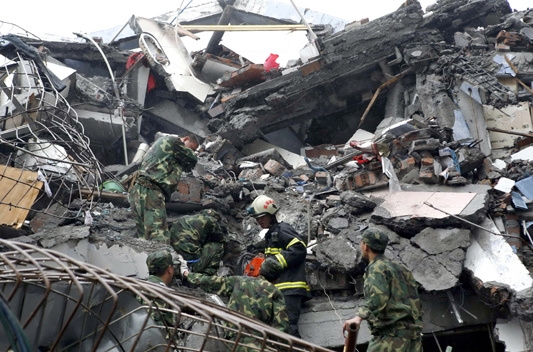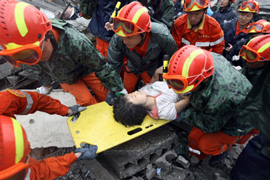Quake survivor search intensifies
Nearly 15,000 confirmed dead in China and tens of thousands believed trapped under buildings.

 |
| Tens of thousands of people are believed to be trapped under buildings [AFP] |
The search for survivors of China‘s deadliest earthquake in 30 years is becoming increasingly frantic as the toll continues to mount.
State media reported that the national death toll from the quake that struck southwest China rose to 14,866 on Wednesday.
Tens of thousands more are believed to be trapped under buildings – more than 18,000 in and around the city of Mianyang alone.
The toll is expected to rise sharply as rescue teams reach hard-hit towns across hilly stretches of Sichuan province that were stricken by Monday’s magnitude-7.9 quake.
Aftershocks
Tens of thousands of people displaced from their homes spent a second night outdoors on Tuesday.
| In depth: China quake | |
Map: Quake disaster zone China’s fast response |
Al Jazeera’s Melissa Chan, reported from Dujiangyan that survivors had no electricity and water on the streets and the local hospital was unable to help those hurt because it had its own cave-in to deal with.
She said aftershocks occurring every few hours brought panic and kept people in a state of fear.
Al Jazeera’s Hamish Macdonald reported from Beijing that in Sichuan‘s capital of Chengdu, 24-hour radio station FM 91.4 was reading out text messages sent by survivors in stricken areas to let relatives know they were safe.
The government has deployed 50,000 soldiers to help with the rescue effort, some 200 hiking over landslide-blocked roads to reach Wenchuan, near the epicentre of the quake, late on Tuesday.
But steady rain hampered search and rescue operations and more rain forecast in the region in the next few days coupled with the fear of landslides, may further hinder relief work.
Only 58 people have been pulled from destroyed buildings across the quake area so far, Zhang Hongwei, a spokesman for China‘s Seismological Bureau, told state-run Xinhua news agency.
Wen Jiabao, China‘s premier who toured the disaster area to oversee relief efforts on Tuesday, called for air drops of emergency supplies to hard-to-reach areas, but rain impeded efforts for a second day.
The government ordered people out of buildings in Mianyang – on the edge of the disaster area – in case of aftershocks, and security guards were posted at apartment blocks to keep people out.
The industrial city of 700,000 people is home to the headquarters of China‘s nuclear weapons design industry, and the quake has sparked fears of nuclear fallout.
Food dwindled on the shelves of the few stores that remained open and petrol was scarce, with long lines outside some stations and pumps marked “empty”.
The finance ministry said it had allocated $123m in quake aid.
Foreign aid
Aid agencies such as the International Red Cross and Oxfam are pouring money and supplies into the region.
Russia said it was sending an aircraft with 30 tonnes of relief supplies while the US is offering an initial $500,000 in aid.
 |
| Beijing says only 58 people have been pulled from buildings in the quake area so far [AFP] |
The government said it welcomed outside aid but officials said that the assistance would be confined to money and supplies, not to foreign personnel.
“We welcome funds and supplies. We can’t accommodate personnel at this point,” Wang Zhenyao, the Civil Affairs Ministry’s top disaster relief official, told reporters in Beijing.
The government’s rapid and rigorous response aimed to reassure Chinese while showing the world it was capable of handling the disaster ahead of the August Olympics in Beijing.
Bowing to public calls, Olympics organisers scaled down the boisterous ongoing torch relay, saying Wednesday’s leg in the southeastern city of Ruijin will begin with a minute of silence and more sombre ceremonies.
People along the route, which next month is scheduled to arrive in quake-hit areas, would be asked for donations, an organising committee spokesman said.
Seismologists said the quake was on a level the region sees once every 50 to 100 years.
